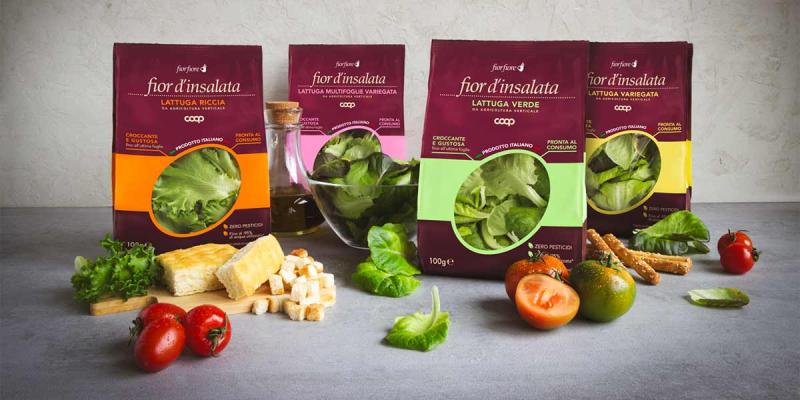Retail co-ops in Europe have signed deals with agri-tech companies to develop vertical food growing systems as climate change and extreme weather events threaten to disrupt supplies.
Coop Norway has announced a joint venture with agri tech business Avisomo, which will see the retailer invest in an automated vertical-farming production system.
The joint venture, Himmelgrønt AS, is a response to the rising frequency of drought, floods and sandstorms in southern Europe, which are disrupting steady supplies of leafy salads like rocket and spinach. With Norway also affected by extreme weather, Coop Norway says indoor cultivation will become an important means of reliable food production.
Vertical agriculture is a production technique where the cultivation of plants, including lettuce and herbs, takes place indoors in a closed system, where light, temperature and watering can be regulated in detail.
The concept, first proposed in 1999 by Dickson Despommier, professor of public and environmental health at Columbia University, comes with challenges in terms of high start-up costs and energy demands from the use of supplementary light, and renewable power is necessary to deliver emissions savings.
But it offers a number of benefits, alongside security from weather disruption: it delivers increased crop yield from a smaller unit of land, allows a wider variety of crops and has less impact on natural habitats. Production in a closed system means that pesticides are not needed, and water circulation results in a drastic reduction in water consumption. The use of hydroponics, means no soil is used; instead the plant is grown in nutrient-rich water.
Related: Coop Norway funds leisure activities for children from low-income families
This provides efficient production with stable product quality and delivery volume, says Coop Norway, as well as a longer shelf life because the product reaches stores more quickly.
“Indoor cultivation in a closed climate will give access to Norwegian-grown products of higher quality all year round,” said Hege Berg-Knutsen, CEO of Coop Norway Industry.
“We will get more stable access, in addition to a significantly lower climate footprint by reducing transport from Europe. With reduced food waste, longer shelf life, and completely clean products free of pesticide residues, this will be a win-win solution for the environment and our customers. Vertically grown products will benefit our consumers, who also own us, in the form of a better and more climate-friendly selection, with a longer shelf life and a completely different taste experience than we get from today’s production.”
The technique also allows for faster development and testing of new products and flavour variants.
“Let’s use rocket as an example,” added Berg-Knutsen. “It is not widely grown in Norway, and significant wastage occurs even before the product is brought in for further processing in Norway, due to long transport.
“There is then further wastage through the washing-and-drying process until the product is packaged. At home, rocket is a product with a limited shelf life, and therefore prone to food waste. By using this cultivation method, the shelf life will be significantly increased, resulting in less waste at all stages of the value chain.”
While vertical farming is a globally proven technology, it has suffered profitability issues as a result of high investments, energy-intensive production and the need for manual labour. The joint venture aims to establish a fully automatic industrial production, based on a completely new technology platform.
“Use of Avisomo’s technology will allow for profitable operation through great flexibility and gradual scaling,” said Berg-Knutsen. “This provides better and more stable deliveries and at the same time helps to ensure Coop’s competitiveness.”
Avisomo is a Norwegian start-up company established in 2018, which specialises in technology for vertical cultivation, with a high degree of automation. Through the Himmelgrønt AS joint venture, investments will be made in testing the concept, alongside associated infrastructure for scalable, fully automatic cultivation. Based on experience, the scope will quickly expand, and eventually the aim is to produce goods worth many millions of kroner.
Related: How co-operatives are mitigating the effects of climate change
“It is fantastically exciting to develop our technology in collaboration with Coop in Norway, which has enormous expertise in industrial food production, and has sales channels,” said Martin Molenaar, general manager of Avisomo AS. “This will help us test out our technology, as a basis for our international expansion. Avisomo has ambitions to become a supplier of vertical systems to the whole world, but first we will help Coop succeed in growing great salad products in order to provide their customers with products of high quality and with a lower climate footprint.”

Meanwhile, Coop Italy has signed a deal with Kilometre Verde, an Italian vertical farming company, which will distribute four salad varieties – multi-leaf lettuce, green lettuce, curly lettuce and variegated lettuce – under the Fior Fiore brand to 700 stores, all packed in compostable paper bags.
“We are proud to start the collaboration with Coop, one of the most important distribution chains in Italy,” said Giuseppe Battagliola, founder of Kilometro Verde.
“This is the result of years of research, which does not only meet the needs of customers but also those of the planet. Sustainable in every aspect: from the first production phase to the final packaging.”
The Fior Fiore products will initially be available in the five co-ops of the Coop Italia consortium (Unicoop Tirreno, Coop Alleanza 3.0, Coop Centro Italia, SAIT and Unicoop Firenze). From January, the consortium of co-operatives from the north-west of the country will be added: Nova Coop in Piedmont, Coop Liguria, and Coop Lombardia. Eventually, the partnership aims to cover the entire Coop network in Italy.
“We immediately believed in the value of the project and wanted to match the vision of Kilometro Verde, including it in the Fior Fiore line of our branded products,” said Claudio Mazzini, head of Freschissimi at Coop Italia.
“We were persuaded by their technology, but above all by the quality and crunchiness of the product.”